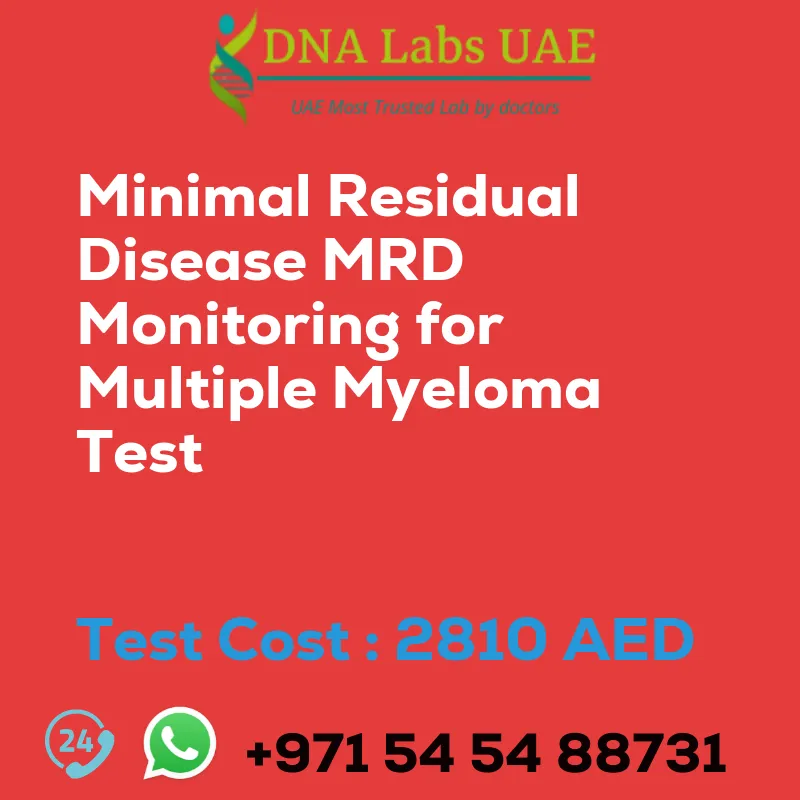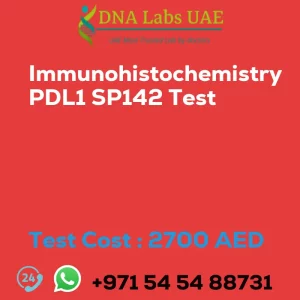MINIMAL RESIDUAL DISEASE MRD MONITORING FOR MULTIPLE MYELOMA Test
Test Cost: AED 2810.0
Test Components:
- CD45
- CD19
- CD20
- CD27
- CD38
- CD138
- CD56
- CD117
- CD200
- CD81
- Kappa
- Lambda
Sample Condition:
3 mL (1 mL min.) Bone Marrow (first pull aspirate) in 1 Green Top (Sodium Heparin) tube. Mix thoroughly & Ship immediately at 18-22°C or at 2-8°C. DO NOT FREEZE. Following information is mandatory:
- Sample time point (Chemotherapy time points)
- Previous diagnostic immunophenotype report
- Clinical History specially mention if patient is on anti-CD38 therapy
- Original TRF
- Date and time when sample was drawn
- 1 or 2 unstained BMA smears to be made at source
Report Delivery:
Sample Daily by 9 am; Report 3 Working days
Method:
FLOW CYTOMETRY
Test Type:
Multiple Myeloma
Doctor:
Oncologist
Test Department:
FLOW CYTOMETRY
Pre Test Information:
Following information is mandatory: Sample time point (Chemotherapy time points); Previous diagnostic immunophenotype report; Clinical History specially mention if patient is on anti-CD38 therapy; original TRF; Date and time when sample was drawn; 1 or 2 unstained BMA smears to be made at source.
Test Details:
Minimal residual disease (MRD) monitoring is a test used in the management of multiple myeloma, a type of blood cancer that affects plasma cells in the bone marrow. MRD testing is performed to assess the response to treatment and to detect any remaining cancer cells after treatment. The test involves analyzing a bone marrow or blood sample to identify and quantify the presence of residual cancer cells. MRD testing is highly sensitive and can detect cancer cells at very low levels, even when conventional tests cannot.
There are different methods used for MRD monitoring, including flow cytometry, next-generation sequencing (NGS), and polymerase chain reaction (PCR). These techniques allow for the detection of specific genetic abnormalities or markers associated with multiple myeloma. MRD monitoring is typically performed at various time points during and after treatment to evaluate the effectiveness of therapy and to guide treatment decisions.
A negative MRD result indicates a deeper response to treatment and may suggest a better prognosis. On the other hand, a positive MRD result indicates the presence of residual disease and may prompt further treatment adjustments or interventions.
Overall, MRD monitoring for multiple myeloma is an important tool in assessing treatment response and guiding treatment decisions. It provides valuable information to healthcare providers and helps in tailoring treatment plans for individual patients.
| Test Name | MINIMAL RESIDUAL DISEASE MRD MONITORING FOR MULTIPLE MYELOMA Test |
|---|---|
| Components | *CD45 *CD19 *CD20 *CD27 *CD38 *CD138 *CD56 *CD117 *CD200 *CD81 *Kappa *Lambda |
| Price | 2810.0 AED |
| Sample Condition | 3 mL (1 mL min.) Bone Marrow (first pull aspirate) in 1 Green Top (Sodium Heparin) tube. Mix thoroughly & Ship immediately at18-22?\u00f8C or at 2-8?\u00f8C. DO NOT FREEZE. Following information is mandatory:\nSample time point (Chemotherapy time points); Previous diagnostic immunophenotype report; Clinical History specially mention if patient is on anti-CD38 therapy; original TRF;Date and time when sample was drawn; 1 or 2 unstained BMA smears to be made at source. |
| Report Delivery | Sample Daily by 9 am; Report 3 Working days |
| Method | FLOW CYTOMETRY |
| Test type | Multiple Myeloma |
| Doctor | Oncologist |
| Test Department: | FLOW CYTOMETRY |
| Pre Test Information | Following information is mandatory: Sample time point (Chemotherapy time points); Previous diagnostic immunophenotype report; Clinical History specially mention if patient is on anti-CD38 therapy; original TRF;Date and time when sample was drawn; 1 or 2 unstained BMA smears to be made at source. |
| Test Details |
Minimal residual disease (MRD) monitoring is a test used in the management of multiple myeloma, a type of blood cancer that affects plasma cells in the bone marrow. MRD testing is performed to assess the response to treatment and to detect any remaining cancer cells after treatment. The test involves analyzing a bone marrow or blood sample to identify and quantify the presence of residual cancer cells. MRD testing is highly sensitive and can detect cancer cells at very low levels, even when conventional tests cannot. There are different methods used for MRD monitoring, including flow cytometry, next-generation sequencing (NGS), and polymerase chain reaction (PCR). These techniques allow for the detection of specific genetic abnormalities or markers associated with multiple myeloma. MRD monitoring is typically performed at various time points during and after treatment to evaluate the effectiveness of therapy and to guide treatment decisions. A negative MRD result indicates a deeper response to treatment and may suggest a better prognosis. On the other hand, a positive MRD result indicates the presence of residual disease and may prompt further treatment adjustments or interventions. Overall, MRD monitoring for multiple myeloma is an important tool in assessing treatment response and guiding treatment decisions. It provides valuable information to healthcare providers and helps in tailoring treatment plans for individual patients. |








